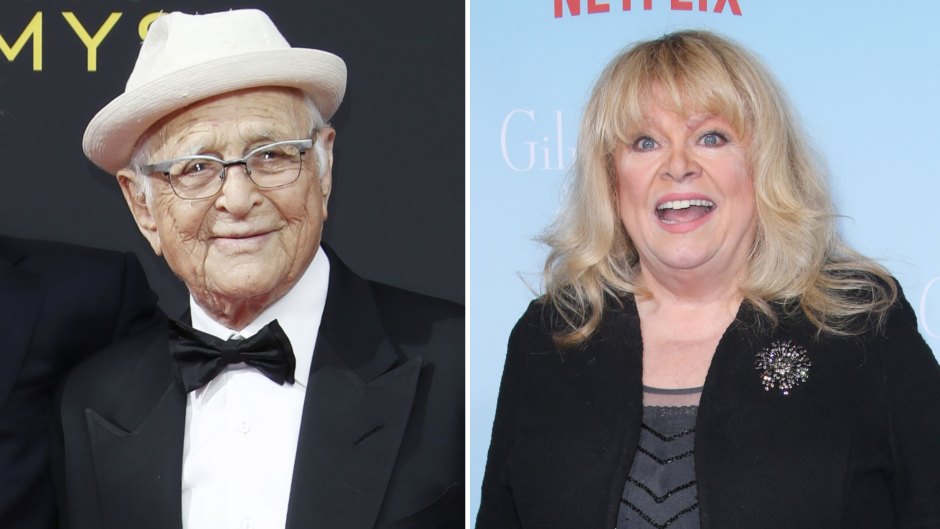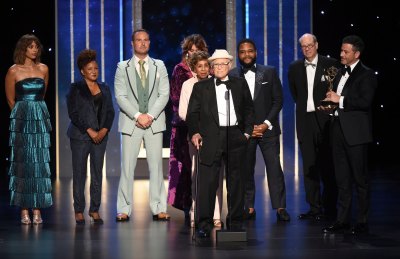
Shutterstock (2)
50 Years of ‘All in the Family’! Norman Lear and Sally Struthers Recall Their Best Memories
Many fans have favorite episodes of All in the Family, but for show creator Norman Lear, “Two’s a Crowd” is one of the top. In it, blue-collar bigot Archie Bunker and his progressive son-in-law, Mike, spend the night trapped together in his bar’s storage room. To pass the time, they drink, argue and eventually connect as Archie opens up about his terrible childhood to the man he called “Meathead.”
“You realized how much they cared for one another despite their disagreements,” Norman, 98, exclusively shares in the latest issue of Closer Weekly, on newsstands now. From the opening shots of row houses in working-class Queens, New York, to Archie and Edith’s ear-splitting yet sweet duet of “Those Were the Days” on their upright piano, All in the Family delivered a slice of American life never seen on TV.

The show, which starred Carroll O’Connor and Jean Stapleton as Archie and Edith and Rob Reiner and Sally Struthers as Mike and Gloria, premiered 50 years ago on January 12, 1971, and remained on the air for nine seasons. Along the way, it gave America permission to talk about real-life topics like war, racism, homosexuality and women’s liberation. “On All in the Family, you actually heard a toilet flush,” Sally, 73, tells Closer. “All of that didn’t go on a family television show before. We opened up Pandora’s box.”
Though he grew up in a Jewish household in Connecticut, Norman loosely based the Bunkers on his parents. “I had a father who used to tell my mother to ‘Stifle it.’ That’s where I got that,” says the famed TV writer, who also was inspired by the British series Till Death Do Us Part. But he notes how Carroll, previously a successful character actor, made Archie his own. “I had the ladder, and he climbed it,” Norman says. “When he sat down and read it, I said, ‘Oh my God, that’s Archie.'”
Rob had already been cast as Mike Stivic when Sally came in to read with him for the part of Gloria — and realized that Rob’s real-life girlfriend, Penny Marshall, was auditioning too. “Of course, he was going to have a rhythm and comfort with Penny. I thought I didn’t stand a chance!” she says. Believing she wouldn’t get the job, Sally dived into the audition fearlessly and, of course, was cast as Gloria.
Sally calls the four actors’ chemistry “a magical mix.” She explained, “We all came from different backgrounds: Carroll was Irish-Catholic, raised in New York, very well-educated; Rob, from Beverly Hills, famous father, rich, Jewish kid; then Jean Stapleton, Christian Scientist raised by a single, opera singer mother in New York; and me, from the Pacific Northwest, where the men are men and the sheep are damp! But we all brought something to the table.”

The cast also trusted in Norman and his partner Bud Yorkin’s vision. “I think Jean and I were more shocked than Rob and Carroll,” says Sally about some of Archie’s most offensive slurs. “We would give each other looks like, ‘What was that?’ None of us had a clue of what was to come!”
Neither did early TV reviewers, who universally praised the cast, but recoiled at Archie’s prejudices. A Hollywood Reporter story called All in the Family “tasteless, crude and very unfunny.” Another reviewer in New York’s Daily News pointed out how Archie’s ethnic slurs made them “very uncomfortable.” But by May 1971, the show had risen to No. 1 in the ratings, beating out family fare like Marcus Welby, M.D., Laugh-In, Bonanza and Gunsmoke.
The cast recognized their popularity even earlier. “Rob and I used to walk out the back door at CBS and across the gigantic parking lot to the farmers market for lunch,” Sally recalls. “Sometime after the first show aired, we couldn’t do that anymore. We were mobbed!”
All in the Family succeeded and became a cultural touchstone because Archie wasn’t the one-dimensional bigot the early reviewers feared, but a flawed man who loved his family, his country and often his neighbors too. “We showed that a person can be misinformed and a bigot, but they can also be lovable and have redeeming qualities,” Sally says. “Archie loved his family, but he had also been raised by someone who taught him those awful things.”

Along the way, America learned to talk — and even disagree — on taboo subjects like war, race, religion and sex. “The network forbid us to deal with all of that, but I can’t recall anything we wished to do that we didn’t ultimately get on the air,” says Norman, who can’t help but look back on All in the Family with pride. Watching the show today “delights me as much as anything in this life delights me,” he says. Sally adds that she remains grateful to have been a part of it. “All in the Family was history-making,” she notes. “That doesn’t happen to many actors.”








































